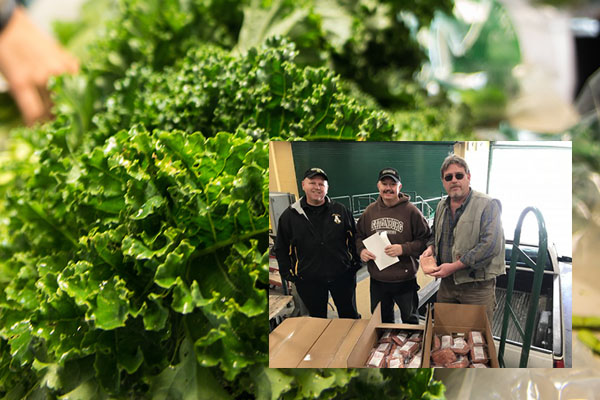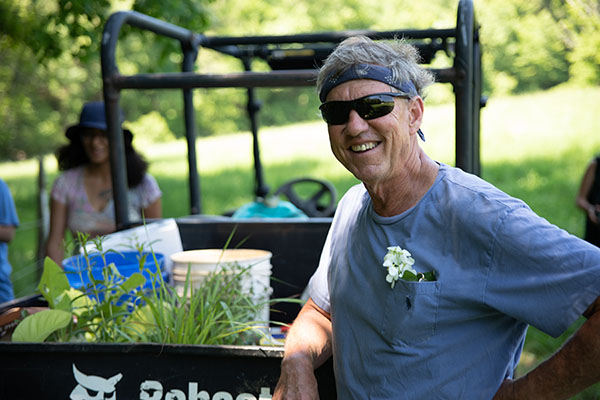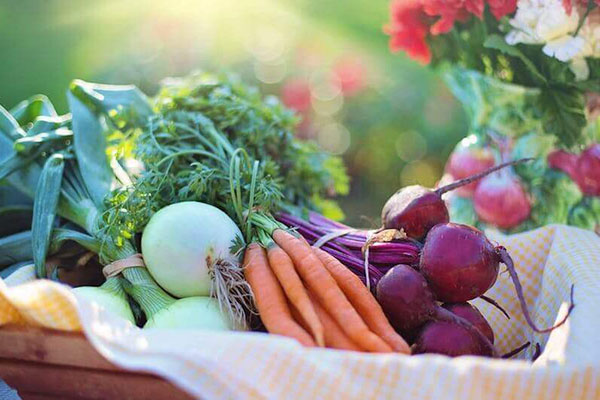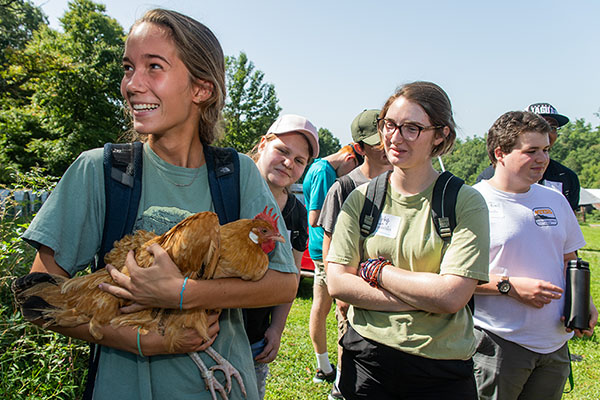BOONE, N.C. — Appalachian State University’s Goodnight Family Department of Sustainable Development and Food Services are continuing their campus farm-to-dining hall partnership with plans to increase the growing capacity of the department’s Teaching and Research Farm, located at the Blackburn–Vannoy property in Ashe County.
The partnership is an integral part of the university’s shared commitment to expanding access to local food from High Country producers, with an aim to increase the amount of hyperlocal product sold to students, faculty and staff in campus dining halls and markets. In the 2017–18 academic year, Food Services purchased 26.86 percent — a monetary equivalent of nearly $1 million — of its food from local sources.
Farm Director Chip Hope said, through the project, the farm will provide Food Services with vegetables, fruits, culinary herbs and edible flowers in addition to the meat the farm currently supplies. The farm supplied 1,325 pounds of sausage to Food Services in 2018 and has supplied 876 pounds of beef thus far in the spring 2019 semester, he said.
Dr. Richard Rheingans, chair of the Department of Sustainable Development, said he is excited for the opportunities the partnership provides for students.
“We want to reach the students where they are. We know they want to be involved in helping to make Appalachian a more sustainable campus, and one way we can do that is offer accessible local food options,” he said.
The partnership, which began in January 2018, now includes an investment from Food Services to build a high-efficiency greenhouse, repair the farm’s existing high tunnel, which is used to extend the growing season, and construct a new poultry house.
Appalachian’s Renewable Energy Initiative, a student-led and student-funded organization that installs renewable energy and energy-efficient projects on campus, has also committed funding toward the project.
“The new greenhouse will be solely devoted to growing items for campus,” Hope said. “Currently, we are working with chefs in Food Services to select the produce we will grow during the coming season and are making plans for how we can take what we’ve learned this year and apply it to our increased capacity once the structure is built.”
As the partnership progresses, Pam Cline, director of Food Services, will work closely with Hope to ensure he’s growing and providing products that best fit student dining needs.
“This collaboration highlights the hard work that both areas of campus do to fulfill the university’s sustainability mission,” she said. “We acknowledge the importance of being responsible stewards of our resources, and we want to prioritize what is important to our campus by continuing to develop this partnership.”
What do you think?
Share your feedback on this story.
About the Goodnight Family Department of Sustainable Development
One of seven departments housed in the College of Fine and Applied Arts, the Goodnight Family Department of Sustainable Development at Appalachian State University prepares students to thoughtfully analyze human development while focusing on the applied practice of pursuing transformative, community-driven development and social change. It offers a Bachelor of Science degree in sustainable development with concentrations in agroecology and sustainable agriculture; community, regional and global development; and environmental studies; as well as a Bachelor of Arts and minor in sustainable development. Learn more at https://sd.appstate.edu.
About the College of Fine and Applied Arts
Appalachian State University’s College of Fine and Applied Arts is a dynamic and innovative group of seven academic departments, bringing together a variety of perspectives, experiences and real-world education to provide unique opportunities for student success. The college has more than 3,500 undergraduate and graduate majors. Its departments are Applied Design, Art, Communication, Military Science and Leadership, Sustainable Development, Sustainable Technology and the Built Environment, and Theatre and Dance. Learn more at https://cfaa.appstate.edu.
About Campus Dining
Campus Dining is owned and operated by Appalachian State University and offers dining services tailored to the campus community’s specific needs. With three dining facilities and daily catering events, Campus Dining provides opportunities for nourishment and also building and fostering relationships over shared meals and experiences. Campus Dining is committed to serving the Appalachian Community using sustainable practices such as local sourcing and contributing to campus composting and a constantly evolving partnership with the Office of Sustainability. Learn more at https://dining.appstate.edu.
About the Appalachian State University Renewable Energy Initiative
The Appalachian State University Renewable Energy Initiative (REI) is a student-led, student-funded organization that seeks to install renewable energy and energy efficiency projects on campus. Projects can be proposed by any member of App State and are carried out by the REI committee with the help of faculty and staff advisors. Since its inception in 2004, the REI has funded over 40 renewable energy and energy efficiency projects, including the Broyhill Wind Turbine, which was the largest wind turbine in North Carolina at the time it was built. REI works closely with App State’s Research Institute for Environment, Energy and Economics and Office of Sustainability and Energy Management. Learn more at https://rei.appstate.edu.
About Appalachian State University
As a premier public institution, Appalachian State University prepares students to lead purposeful lives. App State is one of 17 campuses in the University of North Carolina System, with a national reputation for innovative teaching and opening access to a high-quality, cost-effective education. The university enrolls more than 21,000 students, has a low student-to-faculty ratio and offers more than 150 undergraduate and 80 graduate majors at its Boone and Hickory campuses and through App State Online. Learn more at https://www.appstate.edu.






![How NCInnovation Is Rethinking Economic Development in North Carolina [faculty featured]](/_images/_posts/2026/02/rethinking-economic-development-600x400.jpg)









